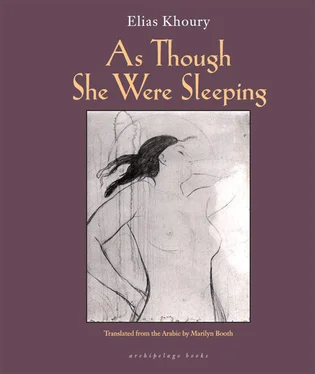Milana told her that Yusuf the Carpenter had been stunned by how quickly the midwife was there, and how quickly she worked in that tiny shelter they had stumbled on in Bethlehem. The woman whom Yusuf found at the door was waiting for him, the nun explained. She knelt beneath Maryam and put out her hand, and the baby boy simply came out seconds later. The Blessed Virgin did suffer pain, added the nun, for no woman could give birth without pain — and that was because of Eve’s original sin. But the pain was light, hardly worth a mention. For the newborn was not the son of sin. He was the new Adam, who had not been cast out of paradise. That was why the old Eve had to come and kneel before the new Eve — our Lady Maryam was the new Eve — to whom all of God’s creation prostrated. When the boy spoke in the cradle he gave thanks to the midwife who pulled him from the belly of his mother and he called her Eve. Maryam heard him say the name but did not dare repeat it to her husband. She was afraid he would believe she was raving, or simply he would not believe her. She told him of her vision but the man frowned and would not allow her to finish the story, insinuating that he knew it all already. But in fact he did not know anything, and he would not know anything until the boy recounted his dream and the elderly father threw himself flat on the ground. He prostrated himself before his wife the Virgin, whom he had not come near because he had doubted her fidelity to him. He would come to her as a husband comes to his wife but only after time had passed, only when age had erased those carnal desires, replacing them with a gentle affection and a tender hand.
This is not how the nun told the story, however. What she said was that when she came running to the home of the Shahin family she saw the yellow hues smothering Saadeh and ordered the midwife to pull the baby girl from her mother’s belly immediately. In that moment she saw two women, the first bending over and drawing the child from its mother’s body while the second woman stood next to her, a shape draped entirely in purple and blue. She was the ancient Eve, the figure said, and from that blessed moment she had been the intercessor of midwives; indeed, she was the midwife whom the Holy Spirit sends to save women from dying in childbirth. Milana said that when she saw these women converge she was certain that God wanted this baby girl to live and be a witness unto Him.
But Tanyous scoffed at Milia when she told him that Mother Eve had attended her birth. This is nonsense, my girl! God sent Eve to observe, that she might see how the pains of birth can disappear if sin disappears. Fine, all right, I don’t want to argue with her version; maybe the nun was a saint and maybe she had a vision. But in the grotto at Bethlehem it did not happen like that. Eve herself — Eve in person — appeared and knelt down and pulled Jesus from his mother’s body. This was the decision taken by the father of Issa Himself, and it was this that forced Yusuf to say nothing for twelve long years. Eve herself uttered only one sentence. Who are you? Yusuf asked her, and he tried to give her money. She refused the money with a brush of her hand and said to him, I am Eve, and then she disappeared. But the real story isn’t here. The real story is the one about the Messiah and the fish. When the Messiah, peace be upon him, walked on the face of the water the fish swam to him bearing a message from Mar Yusuf. People call the tilapia in Lake Tiberias the Mar Butrus after Saint Peter, but its true name is really Mar Yusuf. No one, however, knows this name except the fish, Mar Yusuf, and God. The fish hovered next to him and said, Do not go to Jerusalem, they will kill you there. The Messiah blessed the fish and told it, Have no fear. He said the fishes need not bother with this issue any longer. His father was going to send a sheep.
And this fish? asked Milia. All these words — did the fish really know how to say all of this in Syriac?
Of course. After all, fish do speak, but human beings have forgotten the language of the animals ever since the story with Ibrahim, peace be upon his soul.
What story?
. .
You mean the story of the sacrifice, don’t you?
. .
You mean, he would have slain his own son. Is there anyone who would kill his son?
. .
True, he had to do it. God commanded him to kill his son, and he had no other solution at hand. Not without some anger. . but what else could he do? It was either eat his son or the animal.
. .
Do you mean to tell me that Ishaq sat there with his father and they ate the sheep? No, I am not going to believe this story.
. .
Why do you say this? Do you not fear God?
. .
Yes, two sons, that is what he had. The older one he cast into the desert along with the boy’s mother, Hagar, and the second he took to the mount to offer as a sacrifice.
. .
My God, what am I saying? God forgive me! Maybe the story today has nothing to do with the past, yes, you are right. But then why was Amin killed in Jaffa? And what am I going to do there? Please, please, tell Mansour that Milia is sad and she wants to live by the olive tree here and she can’t bear this.
. .
I don’t like these stories. Let’s go back to the story of the fish. Tell me, now, when the fish carried Yusuf’s message to the Messiah, what response did he give?
. .
Allah yikhalliik , I want to go back to the house now. I’ve lost the way home. And now Mansour is worried, with me in this condition. Take me to the house.
When Mansour listened to her wail that she wanted to go home he felt utterly, devastatingly helpless. Milia had begun to cry out this way, in her sleep, ever since his brother’s murder in Jaffa. It seemed as though this woman had broken the customary rules of her sleep-time and entered into a baffling struggle with all of existence. The first time it happened, he wakened her to tell her that the route to Lebanon was rife with danger but he was prepared to contact the Red Cross to assure a safe passage to Beirut so that she could give birth there. I can’t come with you, though, he added. The situation is difficult and I cannot leave my mother alone. What do you think, my love?
Her drowsy eyes gazed at him, she turned over in bed, rolled onto her right side, and fell asleep again.
Mansour no longer knew how to deal with this woman, for her habits had changed since his brother’s slaying. She no longer got up early. When he left for work she would still be asleep; when he returned home from work he would not find her at home. He learned not to search for her in the town’s streets because if he found her, she would be furious at him. She would accuse him of treating her like a little girl. His new routine was to come home from work and sit waiting for her, anxiety gnawing at him. When she came in she behaved as if nothing had happened. She would go to the kitchen and warm up his meal and as he ate she sat silently by, neither eating nor talking. Whenever he tried to ask her a question her eyes filled with tears and she would say she was worn out and needed to go to bed.
But where do you go every day, God be pleased with you, Milia! This is not good for the child. You are in your final month and the doctor ordered you to rest.
But I’m walking for the child’s sake.
How is that?
How can I make you understand, when it really is not your affair. I don’t want to go to Jaffa, I want to stay here.
But you know why we have to go.
I know and I don’t know, but I’m afraid for my son.
This is crazy talk. You must see a doctor who can talk some sense into you.
He lifted his glass and looked into her eyes and began to recite.
A regard that is drowsy, should it gaze,
or weak and ill and yet to awaken
Читать дальше












